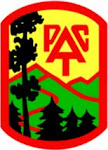In October, the Potomac Appalachian Trail Club (PATC) and Northwood High School’s Technology, Environmental and Systems Sciences Academy were awarded a $7,500 Community Outreach and Awareness grant from the Chesapeake Bay Trust to restore 15 acres of Maryland State Highway Administration land and build a nature interpretive trail, the Northwood Chesapeake Bay Trail, to educate students and the community about human impacts on the Bay and actions they can take to improve its health.
The first step in the eight month project is to clean-up thousands of pounds of trash on the property adjacent to Northwood. On
Sunday, November 22, 2009 from 1:00 pm to 4:00 pm at the entrance to Northwood’s Kaplan Stadium, PATC, Northwood, Friends of Sligo Creek, Neighbors of Northwest Branch, and the MD State Highway Administration invite the community to participate in cleaning up trash on a valuable wooded corridor for animals and a deciduous ecosystem buffer zone for Sligo Creek and Northwest Branch (both in the Chesapeake Bay watershed). Students participating will earn three MCPS student service learning hours.
The MD State Highway Administration bought 15 acres adjacent to Northwood High School for constructing MD Route 193. The property was not constructed on and it stayed mostly unmaintained for years which enabled people to dump household and automotive items on it. The unmaintained and trashed property has been harming wildlife and polluting the soil and a large vernal pool that directly feeds into Northwest Branch, a tributary of the Chesapeake Bay. Last spring, MD SHA, through citizen advocacy, deemed the 15 acres environmentally protected. Eventually, MD SHA will relinquish management to the Department of Natural Resources. Through a memorandum of understanding, PATC and Northwood High School, along with its partners Friends of Sligo Creek and Neighbors of Northwest Branch, will build a nature interpretive trail, connecting it to the Northwest Branch Trail in Northwest Branch Park, and restore a mowed zone into a native plant meadow. Through these actions, the organizations will educate students and neighbors about their impact on the watershed and actions they can implement to improve the health of the watershed and Bay.








